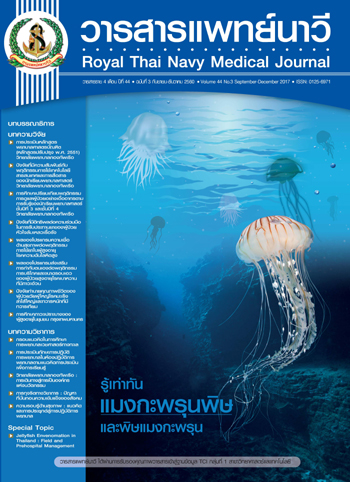ความรอบรู้ด้านสุขภาพ : แนวคิดและการประยุกต์สู่การปฏิบัติการพยาบาล
Main Article Content
บทคัดย่อ
ความรอบรู้ด้านสุขภาพ หมายถึง ความรู้ แรงจูงใจ และความสามารถของประชาชนในการเข้าถึง
เข้าใจ ประเมิน และประยุกต์ข้อมูลข่าวสารทางสุขภาพ เพื่อพิจารณาและตัดสินใจในชีวิตประจำวันเกี่ยวกับ
การดูแลสุขภาพ การส่งเสริมสุขภาพและป้องกันโรค ให้มีคุณภาพชีวิตที่ดีในตลอดช่วงอายุ วัตถุประสงค์
ของบทความนี้เขียนขึ้นเพื่อทบทวนคำจำกัดความ องค์ประกอบและระดับของความรอบรู้ด้านสุขภาพ
ปัจจัยที่เกี่ยวข้องกับความรอบรู้ด้านสุขภาพ แนวทางการพัฒนาความรอบรู้ด้านสุขภาพ และแนวทางการ
ประยุกต์สู่การปฏิบัติการพยาบาล ประชาชนทั่วไปสามารถมีความรอบรู้ด้านสุขภาพได้ โดยการใช้ทักษะ
ที่จำเป็นในการแสวงหา ทำความเข้าใจ ประเมิน สื่อสาร และใช้สารสนเทศด้านสุขภาพ ในขณะเดียวกัน
พยาบาลสามารถส่งเสริมความรอบรู้ด้านสุขภาพได้โดยมีการประเมินระดับความรอบรู้ด้านสุขภาพของ
ผู้รับบริการ การสร้างสัมพันธภาพและสื่อสารในแนวทางที่ทำให้ผู้รับบริการเกิดความเข้าใจ และสามารถ
ปฏิบัติตนตามข้อมูลที่ได้รับดีขึ้น ซึ่งการสื่อสารที่ดียังสามารถเพิ่มความปลอดภัยให้แก่ผู้ป่วยด้วย
Article Details

อนุญาตภายใต้เงื่อนไข Creative Commons Attribution-NonCommercial-NoDerivatives 4.0 International License.
เอกสารอ้างอิง
คณะกรรมการอำนวยการจัดทำแผนพัฒนาสุขภาพแห่งชาติ ฉบับที่ 12 กระทรวงสาธารณสุข. (ร่าง) แผนพัฒนาสุขภาพแห่งชาติ ฉบับที่ 12 พ.ศ. 2560-2564. [อินเทอร์เน็ต]. [เข้าถึงเมื่อ 17 กรกฎาคม 2560]. แหล่งที่มา: https://wops.moph.go.th/ops/oic/data/20161115144754_1_แผน12.2559.pdf.
Mancuso JM. Health Literacy: A concept/ dimensional analysis. Nurs Health Sci 2008; 10(3):248-55.
Ontario Health Promotion E-Bulletin: Health literacy and health promotion. [Internet]. [cited 2017 July 5]. Available from: https://www.ohpe.ca/node/175.
สำนักงานคณะกรรมการพัฒนาการเศรษฐกิจและสังคมแห่งชาติ. ปรัชญาของเศรษฐกิจพอเพียง. กรุงเทพมหานคร: 21 เซ็นจูรี; 2550.
กองสุขศึกษา กรมสนับสนุนบริการสุขภาพ กระทรวงสาธารณสุข. การประเมินและการสร้างเสริมความรอบรู้ด้านสุขภาพ. [อินเทอร์เน็ต]. [เข้าถึงเมื่อ 17 กรกฎาคม 2560]. แหล่งที่มา: http//www.hed.go.t.
World Health Organization. Health Promotion Glossary. Geneva: WHO; 1998. p.1-10.
จินางค์กูร โรจนนันต์. แนวทางการพัฒนาประเทศไทยสู่ Thailand 4.0. ใน เอกสารการประชุมวิชาการส่งเสริมสุขภาพและอนามัยสิ่งแวดล้อมแห่งชาติ ครั้งที่ 10 เรื่อง คนไทยรอบรู้สุข มุ่งสู่ประเทศไทย 4.0. นนทบุรี: กรมอนามัย กระทรวงสาธารณสุข; 2560.
บุญใจ ศรีสถิตนรากูร. กลยุทธ์การจัดการระบบบริการสุขภาพในยุคประชาคมเศรษฐกิจอาเซียน. ปทุมธานี: โรงพิมพ์มหาวิทยาลัยธรรมศาสตร์; 2560.
ขวัญเมือง แก้วดำเกิง. เจาะลึก Health Literacy. ใน เอกสารการประชุมวิชาการสุขศึกษาแห่งชาติ ครั้งที่ 18 เรื่อง การพัฒนาพฤติกรรมสุขภาพยุค 4.0. ภาควิชาสุขศึกษาและพฤติกรรมศาสตร์ คณะสาธารณสุขศาสตร์ มหาวิทยาลัยมหิดล. กรุงเทพมหานคร: มหาวิทยาลัยมหิดล; 2560. หน้า 8-23.
วิชัย เอกพลากร. รายงานการสำรวจสุขภาพประชาชนไทย โดยการตรวจร่างกายครั้งที่ 5 พ.ศ. 2557. นนทบุรี: สถาบันวิจัยระบบสาธารณสุข; 2557.
กองสุขศึกษา กรมสนับสนุนบริการสุขภาพ กระทรวงสาธารณสุข. ความฉลาดทางสุขภาพ. กรุงเทพมหานคร: นิวธรรมดาการพิมพ์ (ประเทศไทย); 2554.
World Health Organization. Concepts and Examples in the Eastern Mediterranean Region. Individual Empowerment Conference Working Document. 7th Global Conference on Health Promotion. Kenya: Nairobi; 2009.
ขวัญเมือง แก้วดำเกิง, ดวงเนตร ธรรมกุล. การเสริมสร้างความรอบรู้ด้านสุขภาพในประชากรผู้สูงวัย. วารสารวิจัยทางวิทยาศาสตร์สุขภาพ 2558;9(2):1-8.
Sorensen K, Van den Broucke S, Fullam J, Doyle G, Pelikan J, Slonska Z, et al. Health literacy and public health: A systematic review and integration of definitions and models. BMC Public Health 2012;12(80):1-13.
วชิระ เพ็งจันทร์. ความรอบรู้ด้านสุขภาพ. ใน เอกสารการประชุมเชิงปฏิบัติการพัฒนาศักยภาพบุคลากรกรมอนามัย เรื่อง ความรอบรู้สุขภาพมุ่งสู่ประเทศไทย, กรมอนามัย กระทรวงสาธารณสุข. นนทบุรี: กระทรวงสาธารณสุข; 2560.
Nutbeam D. Health Literacy as a public health goal: a challenge for contemporary health education and communication strategies into the 21st century. Health Promotion International 2000;15(3):259-67.
ขวัญเมือง แก้วดำเกิง, นฤมล ตรีเพชรศรีอุไร. ความฉลาดทางสุขภาพ. กองสุขศึกษา กรมสนับสนุนบริการสุขภาพ กระทรวงสาธารณสุข. กรุงเทพมหานคร: สามเจริญพาณิชย์; 2554.
Manganello JA. Health Literacy and adolescents: a framework and agenda for future research. Health Educ Res 2008;23(5):840-7.
Nilnate W, Hengprapro S, Hanvoravongchai P. Level of health literacy in Thai elders, Bangkok, Thailand. J Health Res 2016;30(5):315-21.
สิรินันท์ ชูเชิด, นภาพร วาณิชย์กุล, สุพร ดนัยดุษฎีกุล, ชัยวุฒิ ยศดาสุโรดม. ความสัมพันธ์ระหว่างความแตกฉานทางสุขภาพ ความรุนแรงของโรค ความรับผิดชอบของผู้ป่วย และการรับรู้การดูแลแบบบุคคลเป็นศูนย์กลางกับคุณภาพชีวิตของผู้ป่วยภายหลังผ่าตัดทำทางเบี่ยงหลอดเลือดหัวใจ. J Nurs Sci 2016;34(2) Suppl 1:94-106.
แสงเดือน กิ่งแก้ว, นุสรา ประเสริฐศรี. ความสัมพันธ์ระหว่างความฉลาดทางสุขภาพและพฤติกรรมสุขภาพของผู้สูงอายุที่เป็นโรคเรื้อรังหลายโรค. วารสารพยาบาลกระทรวงสาธารณสุข 2558;25(3):43-54.
Coleman C, Kurtz-Rossi S, McKinney J, Pleasant A, Rootman I, Shohet L. The Calgary Charter on Health Literacy: Rational and core principles for development of health literacy 2012. [Internet]. [cited 2017 July 5]. Available from: https://www.centreforliteracy. qc.ca/ sites/default/files/ CFL_Calgary_Charter_2011.pdf.
Hersh L, Salzman B, Synderman D. Health literacy in primary care practice. Am Fam Physician 2015;92(2):118-24.
อภิญญา อินทรรัตน์. ความฉลาดทางสุขภาพของผู้ประกอบวิชาชีพด้านสุขภาพ. วารสารพยาบาลทหารบก 2557;15(3):174-8.
สุรีย์ ธรรมมิกบวร. การรอบรู้สุขภาพเพื่อการส่งเสริมสุขภาพ: การวิเคราะห์แนวคิด. วารสารคณะพยาบาลศาสตร์ มหาวิทยาลัยขอนแก่น 2551;31(2):53-8.


